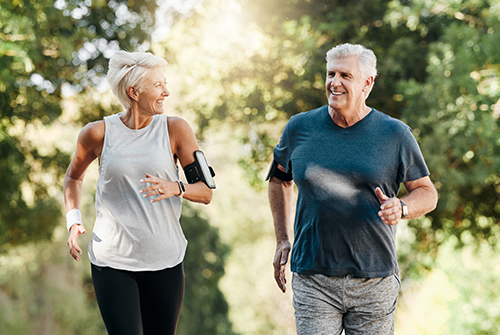
Arthritis affects many joints in your body, including your hips and knees. Inflammation and pain in the hips and knees can make it painful to walk, participate in activities with family and friends. Because of the nature of this pain, numerous patients worry that exercising may not be advisable. Some think that resting is good for their joints. In fact, rest and refraining from activity can actually worsen your condition and your overall health.
It can be hard to imagine exercising while in pain, but exercise can be the medicine your body needs. Exercise is a crucial component of arthritis management, offering benefits and relief.
Your program should encompass three essential types of exercise: range-of-motion exercises for improved flexibility and reduced joint stiffness, strengthening exercises to build muscle mass and protect joints, and aerobic exercise to enhance heart and lung health, overall fitness, and weight control.
A low impact exercise routine offers many benefits to your joints, including managing your arthritis symptoms.
Improve Joint Function
Exercise can improve joint function, helping prevent stiffness in your joints, encouraging flexibility and a wider range of motion. Regular exercise will eventually make everyday movements easier, helping improve your joint functioning. The movement of exercise stimulates the production and circulation of synovial fluid within the joints to facilitate smoother joint motion and reducing friction.
Improve Strength
Building muscle around your arthritic joints will provide more support and stability, reducing the load on the actual joint. Incorporating resistance bands, hand weights, or machines into your workout routine can help build strength.
Weight Management
Maintaining a healthy weight is essential for our overall health. If you are overweight, weight loss is an added benefit from exercise, easing the pressure on your hips and knees. Excess weight can put a larger load on your arthritic joints, worsening your condition and quality of life. For example, extra weight significantly affects your knees, with each step on the ground putting 1½ times your body weight on these joints.1
When engaging in exercise with arthritis, it is important to select joint-friendly activities, gradually build up intensity, and always listen to your body. Consult with a healthcare professional to develop a personalized exercise plan that takes into account your specific type of arthritis and health conditions. A well-designed exercise program can be a valuable component of arthritis management, promoting joint health and improving your overall wellness.
AUTHOR: Robert J. Avino M.D. is a board-certified and fellowship-trained adult hip and knee reconstruction surgeon at Palm Beach Orthopaedic Institute. Dr. Avino specializes in robotic-assisted hip and knee replacement using the minimally invasive direct anterior approach to hip replacement, across Palm Beach County in South Florida.
1. https://www.health.harvard.edu/pain/why-weight-matters-when-it-comes-to-joint-pain










